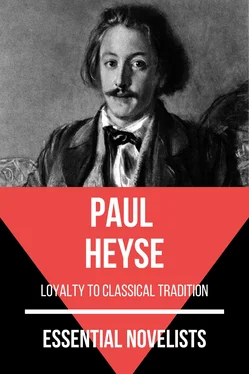He was about to add something, but thought better of it and left the room. On reaching the entry he paused a moment, as if waiting for some one. He was not disappointed. Balder followed him, on the pretext that he had something more to say. But he only pressed his hand in silence, then threw his arms around his neck, hastily released him again, and Franzelius stumbled down the stairs, like a man whose head is heavy or whose eyes are closed.
"He's obeying his evil genius!" said Edwin, shaking his head. "I've seen the fit coming and vainly endeavored to stay it. But water will flow down hill."
"It will soon come to a level and remain stagnant for some time," muttered Mohr. "I'm sorry for the poor fellow! Believe me, Edwin, it was always disagreeable to me to be continually compelled to make fun of him. At heart I not only respected, but liked him. He has exactly what I lack, and because he is not ambitious of distinction, he is indifferent to his own worth. He takes himself just as he is—I believe if he thought he was a superior person liable to be admired in society, he would indignantly ostracise himself."
Balder re-entered the room and they talked of other things; Mohr inquired about the private lessons Edwin was giving the young hedge-princess, as Leah was called in the "tun." But Edwin, whose thoughts were entirely engrossed with the confession his mysterious friend had promised to make on the morrow, gave very absent replies: he was explaining the history of philosophy from his own books. He told her without any oratorical flourishes, how the secret of the universe had been differently reflected in various human brains, how thoughtful minds had endeavored to interpret it and expressed the inexpressible in formulas more and more profound. "I have now come to ideology," he concluded, "which to one who possesses so deep an intellect as this girl, can afford a great deal of pleasure, and be comprehended without much difficulty. I'm amazed to see what progress she makes in Aristotle. Yet, after all, it only confirms the proposition that where a real need exists, the organs for it are formed, as the feeling of hunger always asserts itself when a creature possesses a stomach. It's a pleasure to see this girl listen. She has long languished for knowledge, now she fairly revives like a thirsty plant in the summer rain."
"Congratulate the Frau Doctorin," laughed Mohr.
The brothers' eyes involuntarily met.
"We're now just coming to Plato," Edwin forced himself to answer in a jesting tone. "Whether my pupil, in spite of her studies of hedges and lagunes, has sufficiently elevated thoughts to develop a taste for our 'tun' philosophy, I greatly doubt."
Meantime Franzelius, walking slowly down stairs, as if every step cost him a fresh resolution, had just reached the front of the house. When he came to the glass door that led into the shop, he suddenly stopped.
In the chair behind the show window, where Madame Feyertag was usually enthroned, sat Reginchen. It was already very dark in this corner, for the gas in the shop was usually not lighted in summer, and September, according to the Feyertag calendar, belonged to the summer months; yet notwithstanding this, the printer had perceived at the first glance who it was that sat in the corner knitting a stocking.
He seemed to struggle with himself a moment, then softly opened the door and with a: "Good evening, Fräulein Reginchen!" entered the shop.
"Oh! dear, how you frightened me!" cried the young girl, starting from her seat.
"I beg your pardon," stammered Franzelius, "I ought to have knocked. But I have so many things to think of—sit still, Fraulein Reginchen, I—I only wanted—I came—"
He clutched his cap convulsively in one hand, and was brushing the brim with his elbow.
"My mother has gone out," said Reginchen, to make a little conversation. "But father is still in the work room. If you want to speak to him—"
"Oh no—but allow me—" He picked up the knitting she had dropped, but in so doing let his cap fall, and as she now stooped for it, their heads came in contact somewhat violently. He blushed crimson, but she burst into a merry laugh.
"That's owing to the short days," said she. "But father is anxious to save the gas. I drop so many stitches!"
Then both were silent again.
At last the printer, pausing before the case of ladies' shoes and gazing into it as intently, as if he were endeavoring to count each individual pair, said:
"You're fortunate, Fräulein Reginchen. You can stay in this house. I—I must—from to-day I shall—"
"Are you going away on a journey, Herr Franzelius?"
"No, Fräulein Reginchen, or rather yes!—it amounts to the same thing. I—I'm glad I've met you—I should like—I didn't want to leave without a farewell—"
"Are you going away for long?"
"No one can tell—perhaps I shall never return. Fräulein Reginchen, I cannot hope—you know I—I have always revered you—"
She laughed again in her merry childish way; but if the shop had not been so dark and he had looked at her, he would probably have noticed the deep blush that suffused her face. "Oh gracious!" she exclaimed. "Revered! No one ever did that before. A stupid creature like me, who can't do anything and doesn't understand anything, as mother tells me every day—"
"You don't know your own worth, Reginchen, and that's the best proof of it—I mean that it's no false worth. But excuse me for telling you this so bluntly: It's the first—and last time. And of course you—if I don't come back—will never give me another thought."
The prudent child seemed to know that silence is sometimes the best answer. She coughed several times, and then said: "Where are you going?"
"Wherever the winds and waves carry me!" he replied with sorrowful pathos, and then paced heavily up and down the shop.
"So you're going to sea! Dear me, how frightened I should be! Do you know, Herr Franzelius, I shall tremble every time that the east wind blows and the window panes rattle and the gas lights flicker—and you'll be on the angry sea—"
"Will you really do that, Fräulein Reginchen?" he asked hastily, pausing before her. "If you were in earnest—but no, why should you give yourself useless anxiety about a man who can never—to be sure, I—it will be a real cordial on my journey—and I wanted to say something else: I should like to take a keepsake to remember you and this hour."
"A keepsake?"—she involuntarily glanced at her knitting work, at which he too was looking intently. "I'm just at the heel," she said, "and I suppose you'll not wait till it's done."
"No, Fräulein Reginchen," he replied, "don't think me so presuming as to ask for such a gift—your own handiwork—so unceremoniously. But—if I could find any of your father's work—but I've an ugly foot, which is hard to fit with ready made boots—"
"I could take your measure."
"Yes, you might do that; but no, Reginchen, in the first place I would not accept such a service from you—"
"I would do it willingly, besides, I'm accustomed to it."
"No, no! A creature like you, and such an unlucky mortal as I—but if I could find a pair already made—"
He looked around the walls, sighed, passed his hand through his hair, seemingly endeavoring to avoid her glance.
"You have not the smallest foot in the world," said the girl, looking at his coarse boots with the eye of an connoisseur. "If it were only as long in proportion as it's wide. But it's so short beyond the instep, it would be hard—"
"Won't it? Two elephants' feet!" said the printer laughing bitterly. "We men of the people, who don't tread as often as we're trodden upon, didn't need to have such big feet. But it's no matter. Who knows when our turn will come. Well, Fräulein Reginchen, if you can't—"
Читать дальше












